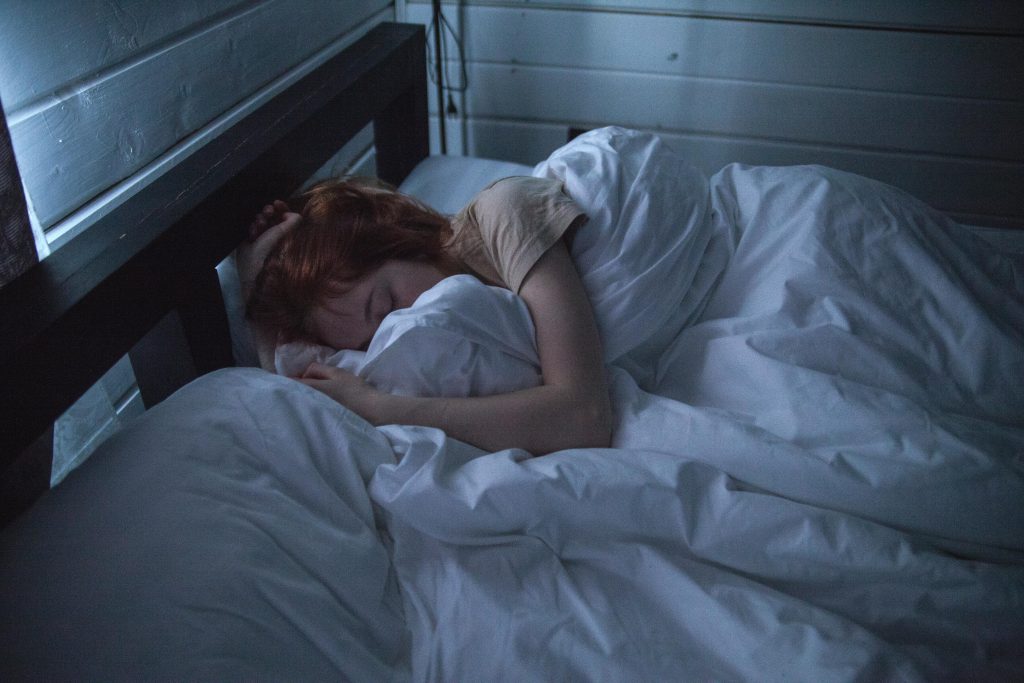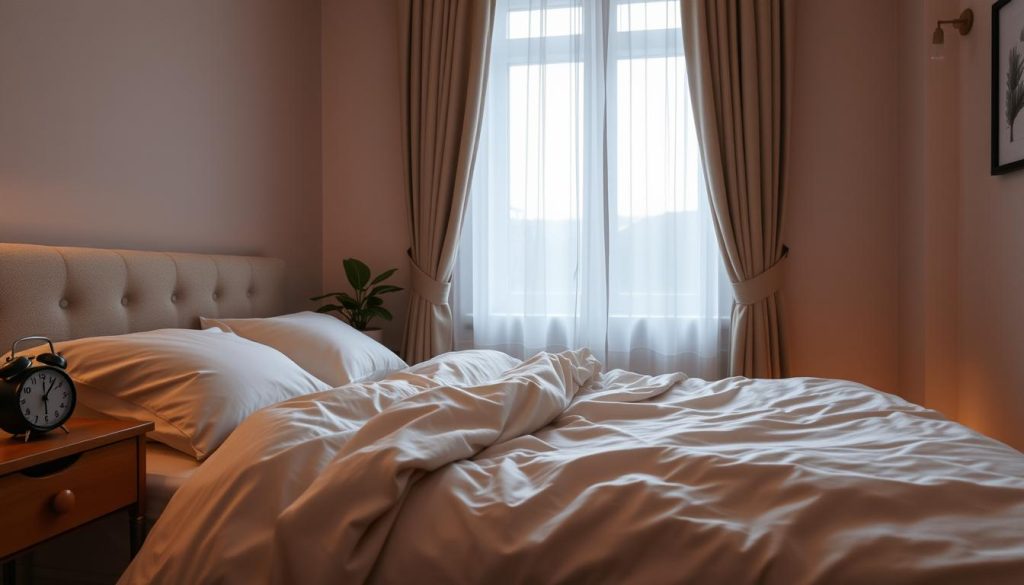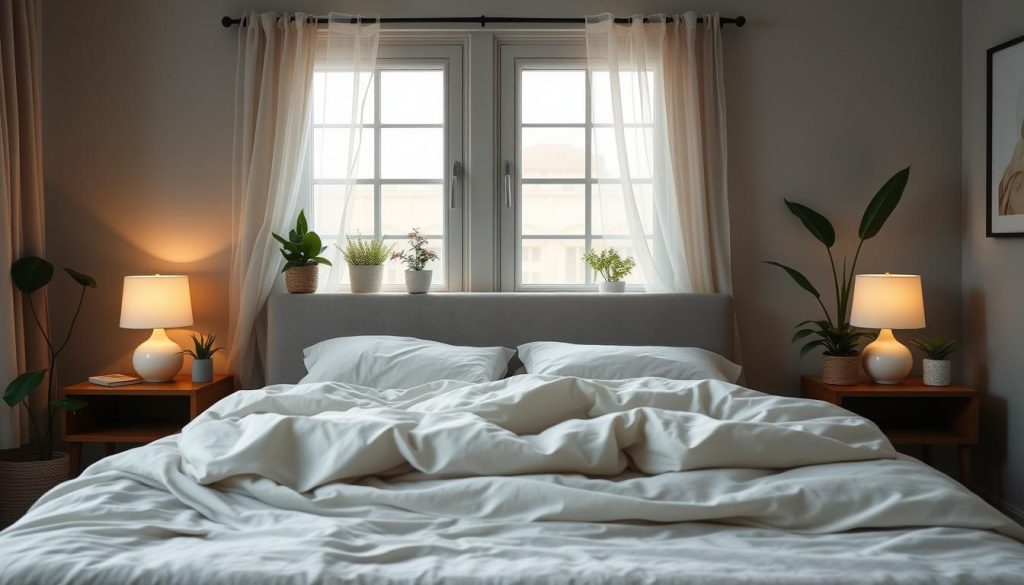Did you know over 35% of American adults get less than 7-8 hours of sleep each night1? Not getting enough sleep can harm your health. It affects your brain and immune system. It’s important to have good sleep habits for better health.

Key Takeaways
- Establishing a consistent sleep schedule is key for regulating your body’s internal clock.
- Limiting exposure to blue light from devices before bed can improve sleep quality.
- Engaging in regular exercise, especially in the morning, can significantly boost sleep duration and quality.
- Maintaining an optimal bedroom temperature between 60-67°F (15.6-19.4°C) can enhance sleep.
- Replacing an old, sagging mattress can provide better support and comfort for quality sleep.
Understanding Sleep Hygiene and Its Impact on Health
Sleep hygiene is about the habits that help you sleep well and feel alert during the day. It’s key for staying healthy. Not getting enough sleep can lead to heart disease, stroke, diabetes, obesity, and Alzheimer’s2. It also helps keep your body’s clock in sync, which is good for your overall health.
Studies link bad sleep habits to more sleep problems3. People with poor sleep habits often feel very tired during the day and might get depressed3. But, good sleep habits can solve sleep issues for good, unlike medicines that only work for a short time4.
To better your sleep, try these tips:
- Avoid caffeine and nicotine for at least 4-6 hours before bedtime24.
- Don’t drink alcohol close to bedtime, as it can mess up your sleep24.
- Do relaxing things, like stretching or deep breathing, before bed4.
- Take a warm bath 1-2 hours before bed to help you sleep24.
- Stick to a regular sleep schedule, even on weekends, to keep your sleep healthy2.
Good sleep habits can make you healthier and reduce sleep problems234.

| Sleep Hygiene Practices | Impact on Sleep |
|---|---|
| Avoiding caffeine and nicotine before bedtime | Improved sleep quality |
| Limiting alcohol consumption before sleep | Enhanced sleep quality |
| Engaging in relaxing activities before bed | Easier transition to sleep |
| Taking a warm bath before bedtime | Induces sleepiness |
| Maintaining a consistent sleep schedule | Reinforces healthy sleep patterns |
“Prioritizing good sleep hygiene is essential for maintaining overall health and well-being.”
By following these sleep habits, you can sleep better, keep your body’s clock in sync, and lower the risk of sleep disorders and health problems234.
Creating the Perfect Sleep Environment
Creating a great sleep environment is key to falling asleep quickly and sleeping well5. In the U.S., one third of adults don’t get enough sleep each night6. The U.S. Centers for Disease Control and Prevention says 33% of adults are sleep-deprived. Focus on the right temperature, lighting, sound, and bedding to make a restful space.
Optimal Room Temperature Settings
The best sleep room temperature is between 60°F and 67°F (15.6°C to 19.4°C)7. The U.S. Army Performance Triad offers 10 sleep tips, including keeping the room cool. A cool room helps your body naturally cool down, leading to better sleep.
Light and Sound Management
It’s important to control light and sound for a good sleep environment6. Most adults need 7 to 9 hours of sleep each night, studies show. Natural light during the day helps your body clock, while darkness at night boosts melatonin, the sleep hormone. Use blackout curtains or an eye mask and earplugs or a white noise machine to block out noise.
Choosing the Right Bedding
Good bedding, like a supportive mattress and pillows, is crucial for a good night’s sleep6. Not sleeping enough can lead to brain toxin buildup and Alzheimer’s disease, research says6. People who don’t sleep well are more likely to get diseases like high blood pressure and diabetes. Choose a mattress and pillows that feel right for you to avoid discomfort and sleep better.
By making your sleep space better, you can sleep faster and better. Small changes can greatly improve your health and happiness.

10 Healthy Sleep Hygiene Tips
Good sleep habits are key to feeling your best. By following these 10 tips, you can sleep better and feel healthier8.
- Maintain a consistent sleep schedule: Go to bed and wake up at the same time, even on weekends, to regulate your body’s internal clock8.
- Create a relaxing bedtime routine: Engage in calming activities, such as reading, light stretching, or meditation, to signal to your body that it’s time to wind down.
- Limit electronic device use before bed: The blue light emitted by screens can disrupt your natural melatonin production, making it harder to fall asleep9.
- Exercise regularly: Physical activity during the day can promote better sleep, but avoid intense workouts close to bedtime9.
- Manage caffeine and alcohol intake: Consume caffeine earlier in the day and avoid alcohol close to bedtime, as both can interfere with sleep quality9.
- Optimize your sleep environment: Keep the room cool, dark, and quiet for optimal sleep conditions8910.
- Use the bed only for sleep and sex: Avoid engaging in non-sleep-related activities in your bed, as this can weaken the association between your bed and sleep9.
- Go to bed when you’re tired: If you’re unable to fall asleep within 20 minutes, get up and engage in a relaxing activity until you feel sleepy again9.
- Limit daytime napping: Short, 20-minute power naps can be beneficial, but longer daytime naps may disrupt your sleep schedule89.
- Manage stress before bedtime: Practice relaxation techniques, such as deep breathing, meditation, or gentle yoga, to help your body and mind unwind before sleep.
By following these 10 tips, you can sleep better and feel healthier8910.
Remember, good sleep is key for your health. By focusing on these 10 tips, you can improve your sleep and enjoy a healthier life.
Establishing a Consistent Sleep Schedule
Getting quality sleep starts with a regular sleep schedule. Set a fixed bedtime and wake-up time, even on weekends. This helps your body get into a natural sleep cycle, making it easier to sleep and wake up refreshed11. Research shows that good sleep habits are key to health, while bad habits can harm you11.
Benefits of Regular Sleep Timing
Sticking to a sleep schedule helps your body’s internal clock work better. This improves sleep quality, reduces daytime tiredness, and boosts brain function11. Adults need at least seven hours of sleep, with most needing no more than eight to feel rested12.
Weekend Sleep Patterns
It’s tempting to sleep in on weekends, but keep a consistent wake-up time. Waking up at the same time every day keeps your sleep routine steady and prevents clock disruptions11. Long naps can mess up your nighttime sleep, so limit them to one hour and avoid napping late12.
Adjusting Your Internal Clock
Changing your sleep schedule should be done slowly. Shift your bedtime and wake-up time by 15-30 minutes each day for easier adaptation11. A calming bedtime routine 30-60 minutes before sleep helps your body relax and prepare for sleep11.
By focusing on a consistent sleep schedule and healthy bedtime habits, you’re on the right path to better sleep11. Good sleep hygiene is vital for your health and happiness11.
Technology and Sleep: Managing Screen Time
In today’s world, we use electronic devices a lot. But, it can really affect how well we sleep13. More than 33% of Americans don’t get enough sleep, which is at least 7 hours in 24 hours13. Also, about 15% of adults have trouble falling asleep, and 1 in 4 Americans deal with insomnia each year13.
The problem is the blue light from our phones, computers, and TVs. It can lower melatonin levels, making it hard to fall and stay asleep13. Screen use, especially at night, can cut down on REM and deep sleep. This makes people feel tired even after sleeping 7-9 hours13.
To fight the bad effects of tech on sleep, we need to make healthy choices. Try not to use phones, computers, and TVs an hour before bed13. Use night mode settings on devices to lessen blue light13. Also, keep electronic devices out of the bedroom to avoid sleep disruptions from notifications or sudden light13.
Instead of screens, choose relaxing activities like reading a book, listening to calming music, or meditating to get ready for sleep13. Good sleep habits are key for your health and happiness. By controlling your screen time, you can sleep better and wake up feeling refreshed13.
Too much screen time can make it hard for people with insomnia to fall or stay asleep13. High screen time can also lead to obesity, depression, unhealthy eating, and a lower quality of life13.
“The ideal sleeping temperature is between 60 and 67 degrees Fahrenheit13. Taking naps late in the day can make it hard to fall asleep at night13. Late-night use of nicotine, alcohol, and caffeine can also disrupt sleep, making it harder to fall or stay asleep.”13
By focusing on sleep hygiene and managing screen time, you can enjoy many benefits of good sleep. These include better physical and mental health, lower risks of accidents and chronic diseases, and improved work or school performance13.
Encouraging face-to-face interactions with family, friends, or coworkers can help balance screen time during the day13. It’s good to limit screen access for kids only when necessary or for online learning13.
| Impact of Screen Time on Sleep | Percentage |
|---|---|
| Toddlers, preschoolers, and school-age children affected by insufficient sleep due to widespread use of electronic devices | 30%14 |
| Studies finding an association between screen media use and delayed bedtime and/or decreased total sleep time in youth | 90%14 |
| American children and adolescents have at least one screen-media device in their bedroom | 75%14 |
| American children and adolescents using screen-media devices regularly in the hour before bedtime | Approximately 60%14 |
| Young children (toddlers) having TVs in their bedrooms | 36%14 |
| Tweens and teens having TVs in their bedrooms | 47% and 57%, respectively14 |
| Youth keeping at least one electronic device in their bedroom | 75%14 |
| Parents believing that watching TV helps their infant, toddler, or preschooler ‘wind down’ in the evening | 50%14 |
Diet and Exercise for Better Sleep
Keeping a healthy lifestyle can really help your sleep. Start by focusing on your diet and exercise15. Eating well can lower the risk of heart disease, stroke, diabetes, and obesity15. It can also help with depression and anxiety, which can mess with your sleep15.
Timing Your Meals
Avoid big meals 2-3 hours before bed to avoid indigestion and acid reflux6. It’s best not to eat or drink three hours before bedtime to sleep better6.
Best Pre-Sleep Foods
Eat foods high in tryptophan and serotonin like milk, chicken, turkey, and pumpkin seeds. They help make melatonin, the sleep hormone10. Stay away from spicy food, alcohol, and big meals before bed as they can mess with your sleep10.
Exercise Schedule Optimization
15 Regular exercise can make your sleep better, but do intense workouts at least 3 hours before bed15. Try to do 30 minutes of aerobic exercise daily, outside for natural light15. Both cardio and weightlifting can help your sleep15. Younger people need more exercise to see sleep benefits15. Exercise can also cut down on sleep problems like insomnia and restless legs syndrome15.
6 Not getting enough sleep can make your waist bigger and increase obesity risk6. Eating well and exercising together is better than just one15.
“Maintaining a healthy lifestyle can significantly improve your sleep quality.”
Remember, a balanced diet and exercise are key for better sleep and health15610.
Relaxation Techniques for Quality Rest
To fall asleep faster and sleep better, adding relaxation techniques to your bedtime routine is key16. Stress and anxiety often lead to sleep problems16. Relaxation exercises can lower stress and improve sleep quality16.
Deep breathing exercises, like the 4-7-8 method, are very effective16. You breathe in for 4 seconds, hold for 7, and breathe out for 8. This method helps relax and makes you sleepy16. Body scans, a meditation technique, also reduce stress and prepare you for sleep16.
Yoga nidra is another great technique for calmness and better sleep16. Progressive muscle relaxation, tensing and relaxing muscles, promotes relaxation16. Non-sleep deep rest (NSDR) helps you relax without sleeping, boosting energy and rest16.
Regular practice of these techniques is vital16. Being consistent is key to improving your sleep16.
Creating the perfect sleep environment is also important17. A quiet, dark, cool room helps you sleep better17. Eating well during the day and avoiding caffeine, nicotine, and alcohol before bed also helps17.
Common Sleep Disruptors to Avoid
Getting quality sleep is vital for your health. But, many things can mess with your sleep. Knowing and avoiding these disruptors is key to better sleep and health.
Caffeine and Alcohol Impact
Caffeine in the afternoon or evening can mess with your sleep18. Alcohol might make you sleepy at first but can ruin your sleep later19.
Environmental Factors
Your sleep space is very important. Noise, light, and temperature changes can mess with your sleep. Using curtains, earplugs, or machines can help make a better sleep space19.
Stress Management
Stress and anxiety can keep your mind racing and stop you from sleeping. Techniques like journaling, meditation, or talking to a therapist can help you relax and sleep better19.
| Sleep Disruptors | Impact on Sleep | Recommended Solutions |
|---|---|---|
| Caffeine | Interferes with falling asleep and staying asleep | Avoid caffeine, especially in the afternoon and evening |
| Alcohol | Leads to fragmented sleep and poor sleep quality | Limit alcohol consumption, especially before bedtime |
| Noise, light, and temperature | Disrupts sleep environment and sleep cycles | Use blackout curtains, earplugs, or white noise machines |
| Stress and anxiety | Prevents relaxation and disrupts sleep | Incorporate stress-management techniques, such as journaling or meditation |
By avoiding these common sleep disruptors, you can improve your sleep. Remember, good sleep habits are key for your health1819.
Conclusion
Healthy sleep habits can greatly improve your sleep and health20. Adults need 7 to 8 hours of sleep for the best health. Sleep needs change as we age20.
Being consistent is important for good sleep habits. What works for one person might not work for another21.
A quiet, comfortable bedroom helps a lot21. The right temperature and few distractions are key. Also, relaxation techniques, less screen time, and a good diet and exercise routine can help2122.
If you still have sleep problems, see a doctor or sleep specialist22. Finding quality sleep might take some trying, but it’s worth it. Start tonight by trying one or two of these tips and add more as you go22.